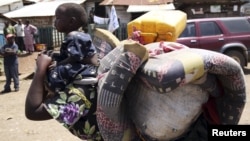GENEVA, SWITZERLAND —
The U.N. refugee agency says it is very worried about the security of displaced people and aid workers in camps in eastern Democratic Republic of Congo after an attack Saturday at a camp outside Goma. The UNHCR and other aid agencies say increasing violence in the region is preventing the delivery of urgently needed assistance to tens of thousands of internally displaced people.
The U.N. refugee agency says fortunately no one was killed during the attack at the Mugunga III camp, but several cases of rape were reported. It says people in the camp are anxious and upset.
UNHCR spokesman Adrian Edwards said the attack occurred a few hours after the World Food Programme had distributed rations to the camp population. He said armed men searched tents and stole money, mobile phones and food that had been handed out earlier by WFP.
“Looting was also reported among the population living immediately adjacent to the camp," said Edwards. "It is also being reported that around a dozen IDPs were forced to carry looted materials out of the camp. The few police there were unable to intervene, while MONUSCO [United Nations Organization Stabilization Mission in the DRC] troops, who also face capacity constraints, were not in a position to maintain a permanent presence at the site.”
Crowded Mugunga III camp
The UNHCR reports at least 30,000 people are currently at the Mugunga III camp. About 75,000 more are staying at other sites, while thousands of others are living at spontaneous sites or with host communities.
Edwards said the recent attack highlights the need for greater security at sites for internally displaced people. He said there also needs to be improved humanitarian access so people can get better care.
The U.N. Children’s Fund agrees with this assessment. It says a survey of internally displaced families in Goma and along the Sake axis finds they lack the most basic non-food items. UNICEF spokeswoman Marixie Mercado said most families have no fuel cans, no mosquito nets, no sleeping materials, no cooking utensils, or extra clothes.
Multiple concerns
“Despite these acute needs, plans for a massive blanket distribution of a basic non-food item kit to an estimated 30,000 families in all the camps have been put on hold due to the risk of systematic looting of the kind that was seen in Mugunga III on Saturday," said Mercado. "We have 12 cases of sexual-assault survivors from Mugunga III camp, including three girls who have been provided with treatment and care by UNICEF’s partner Hope in Action. And Mugunga hospital now has recorded 72 cases of rape.”
Mercado said that more than 650 unaccompanied minors have been identified, but so far only 14 children have been reunited with their families. She said at least four cases of measles are confirmed among IDPs and UNICEF is concerned about a rise in the number of cholera cases.
She said UNICEF and partners are planning a measles and polio vaccination campaign that will begin in the camps near Goma in the coming days.
The U.N. refugee agency says fortunately no one was killed during the attack at the Mugunga III camp, but several cases of rape were reported. It says people in the camp are anxious and upset.
UNHCR spokesman Adrian Edwards said the attack occurred a few hours after the World Food Programme had distributed rations to the camp population. He said armed men searched tents and stole money, mobile phones and food that had been handed out earlier by WFP.
“Looting was also reported among the population living immediately adjacent to the camp," said Edwards. "It is also being reported that around a dozen IDPs were forced to carry looted materials out of the camp. The few police there were unable to intervene, while MONUSCO [United Nations Organization Stabilization Mission in the DRC] troops, who also face capacity constraints, were not in a position to maintain a permanent presence at the site.”
Crowded Mugunga III camp
The UNHCR reports at least 30,000 people are currently at the Mugunga III camp. About 75,000 more are staying at other sites, while thousands of others are living at spontaneous sites or with host communities.
Edwards said the recent attack highlights the need for greater security at sites for internally displaced people. He said there also needs to be improved humanitarian access so people can get better care.
The U.N. Children’s Fund agrees with this assessment. It says a survey of internally displaced families in Goma and along the Sake axis finds they lack the most basic non-food items. UNICEF spokeswoman Marixie Mercado said most families have no fuel cans, no mosquito nets, no sleeping materials, no cooking utensils, or extra clothes.
Multiple concerns
“Despite these acute needs, plans for a massive blanket distribution of a basic non-food item kit to an estimated 30,000 families in all the camps have been put on hold due to the risk of systematic looting of the kind that was seen in Mugunga III on Saturday," said Mercado. "We have 12 cases of sexual-assault survivors from Mugunga III camp, including three girls who have been provided with treatment and care by UNICEF’s partner Hope in Action. And Mugunga hospital now has recorded 72 cases of rape.”
Mercado said that more than 650 unaccompanied minors have been identified, but so far only 14 children have been reunited with their families. She said at least four cases of measles are confirmed among IDPs and UNICEF is concerned about a rise in the number of cholera cases.
She said UNICEF and partners are planning a measles and polio vaccination campaign that will begin in the camps near Goma in the coming days.




